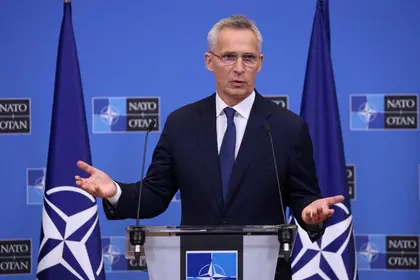Jens Stoltenberg, the General Secretary of NATO, has advised members of the European Parliament to “stop complaining and step up and provide support to Ukraine”.
Stoltenberg argued that member nation States of the European Union should have the united goal of providing unprecedented support to the embattled country for as long as needed.
JOIN US ON TELEGRAM
Follow our coverage of the war on the @Kyivpost_official.
He said “The price we pay as the European Union, as NATO, is the price we can measure in currency, in money. The price they [Ukrainians] pay is measured in lives lost every day”.
“We should stop complaining and step up and provide support, full stop,” he added.
Stoltenberg also emphasized that danger could lurk for Europe if the EU does not step up to this vital role. “It is in our interest to help Ukraine because you have to understand that if Ukraine loses this, that’s a danger for us.”
“If you don’t care about the moral aspect of this, supporting the people of Ukraine, you should care about your own security interests.
“Pay for the support, pay for the humanitarian aid, pay the consequences of the economic sanctions, because the alternative is to pay a much higher price later on” he added.
Back in May, the EU pledged up to 9 billion euros to help Ukraine, however it has been considerably slow in providing the financial aid.
As inflation skyrockets and Europe witnesses a devastating energy crisis, several governments have been considerably resistant to provide more financial aid to help people in Ukraine. Particularly, Germany has been accused of blocking the 9 billion aid package to Ukraine, according to sources such as the Italian newspaper Corriere Della Sera.

Diane Francis Interviews Mikhail Zygar, Yaroslav Trofimov on Prospects of Russia’s War on Ukraine
In mid-July, President Zelensky removed Kyiv’s ambassador from Berlin, which raised concerns regarding Germany’s stance on providing the billion-dollar aid package.
Christian Lindner, German Finance Minister, spoke to multiple media outlets, voicing his disapproval of financing the aid from the common Europe debt, despite taking identical measures during the financial crisis caused by the pandemic.
Tensions between Kyiv and Berlin are said to be rising, reflected in a poll, organized by Lord Ashcroft, which discovered that the German Chancellor Olaf Scholz had a favorability rating of just over 40 percent in the eyes of Ukrainian people.
However, despite such instabilities within the EU parliament, it was revealed today that the EU has finally agreed to provide another 500 million euros in military aid to Ukraine.
“Today at the EU foreign ministers meeting, a political agreement was reached on the fifth tranche of military assistance to Ukraine,” Sweden’s Foreign Minister Ann Linde said in a statement.
You can also highlight the text and press Ctrl + Enter







